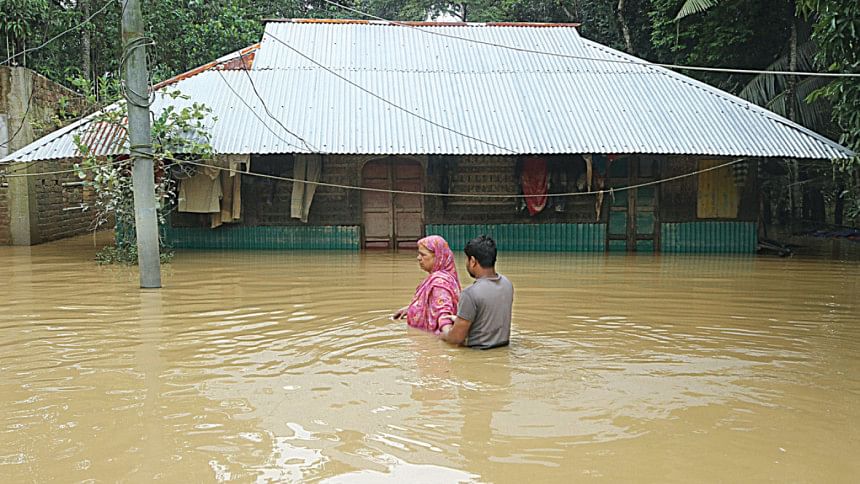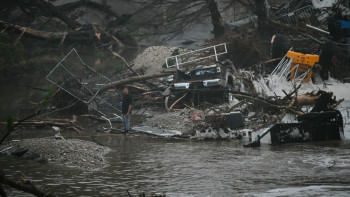August floods caused Tk 14,000cr loss: CPD

The late August floods caused damage worth an estimated Tk 14,421.46 crore, and the government would need to increase its budget for relief distribution, according to a study of the Centre for Policy Dialogue.
The study highlighted that the damage was equivalent to 1.81 percent of the national budget and 0.26 percent of the projected GDP for FY25.
The findings were presented at a press briefing titled "Recent Flood Damage and Rehabilitation Process in Eastern Region: CPD's Analysis" at the think-tank's office in the capital yesterday.
The floods were caused by continuous heavy rains and onrush of water from upstream and affected 11 districts in the region.
The CPD's damage assessment focused on Sylhet, Moulvibazar, Habiganj, Feni, Khagrachhari, Cox's Bazar, Cumilla, Noakhali, Chattogram, Lakshmipur, and Brahmanbaria.
The CPD collected primary data through key informant interviews, focus group discussions, NGO representatives, and government officials. It also conducted field visits to Noakhali, Lakshmipur, and Feni.
The agriculture and forest sectors were the hardest hit. They suffered damage worth Tk 5,169.71 crore, or 35.85 percent of the total.
The loss to infrastructure was worth Tk 4,653.92 crore, 32.27 percent of the total. Damage worth Tk 2,407.31 crore, 16.69 percent of the total, were done to homes.
Noakhali accounted for 29.07 percent of the total damage, followed by Cumilla, 23.51 percent; Feni, 18.61 percent; and Chattogram, 11.63 percent.
During the recent floods, homes were badly affected, with many hovels were destroyed. The loss of crops and fish was huge, said Muntaseer Kamal, senior research fellow at the CPD, while presenting the findings.
The water bodies will require reinvestment before they can be used again. Poultry farms, particularly chicken farms, also suffered with entrepreneurs losing nearly all their investments.
Small businesses, especially grocery shops, faced severe challenges as they had to shut down, incurring heavy losses.
Electricity supply and internet access were disrupted.
Waterlogging persists in Noakhali and Lakshmipur, damaging roads, bridges, and culverts.
Educational institutions had their furniture and equipment on the ground floors destroyed, and children unable to go to school.
The study recommended social safety net allocations, particularly for elderly citizens, widows, and destitute women, be increased after careful assessment. Ensuring easy access to finance and providing debt relief were also highlighted.
The government needs to ensure that farmers can get agricultural loans easily. Small businesses, many of which have taken loans from microfinance organisations, may benefit from loan repayment moratoriums and extended repayment periods, the study said.
To protect the agricultural sector, it emphasised ensuring an adequate supply of seeds as the floods destroyed many seedbeds.
The study recommended immediate government preparations for rice imports and reductions in agricultural input import duties as the extensive damage to agriculture is also likely to affect food security.
Keeping inflation under control will be a significant challenge, it added.
The study also stressed the need for improving emergency response system.
Radio communication systems between administrative offices should be established for use when mobile networks are down, and ambulance boats must be available in flood-affected areas.
Effective coordination between various stakeholders, including the meteorological department and local government units, is vital for rapid emergency response, it said.
Enhancing the capacity of government relief offices by ensuring adequate personnel and training is also crucial, along with improving embankments and upgrading forecasting and early warning systems.
Khondaker Golam Moazzem, research director at the CPD, said Bangladesh should prepare with the understanding that the country will face floods more frequently.
He said recent floods have been particularly devastating as they were prolonged.
The damage at the individual level are more severe than ever before, necessitating long-term credit support for recovery, he added.
Fahmida Khatun, executive director at the CPD, said the nature of the floods was somewhat different from previous ones. Areas that typically do not experience flooding were inundated.
"As a result, the affected people, as well as those involved in relief efforts, were unprepared," she said.

 For all latest news, follow The Daily Star's Google News channel.
For all latest news, follow The Daily Star's Google News channel. 



Comments